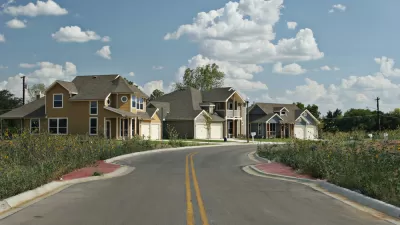Consumer preference surveys indicate that total U.S. demand for large-lot, exurban housing will not increase, while demand for small-lot and attached housing in accessible, multi-modal locations will double during the next two decades.
A new report released by the Victoria Transport Policy Institute suggests that a majority of consumers prefer living in smart growth communities. "Where We Want To Be: Home Location Preferences And Their Implications For Smart Growth" (www.vtpi.org/sgcp.pdf) indicates that the existing stock of large-lot, exurban homes is sufficient to satisfy market demand for the next two decades, but the number of small-lot and attached housing in accessible locations with multi-modal transportation systems must approximately double to meet consumer needs.
Thanks to Todd Litman
FULL STORY: Where We Want To Be: Home Location Preferences And Their Implications For Smart Growth

Montreal Mall to Become 6,000 Housing Units
Place Versailles will be transformed into a mixed-use complex over the next 25 years.

Planetizen Federal Action Tracker
A weekly monitor of how Trump’s orders and actions are impacting planners and planning in America.

DARTSpace Platform Streamlines Dallas TOD Application Process
The Dallas transit agency hopes a shorter permitting timeline will boost transit-oriented development around rail stations.

Interactive Map Reveals America's “Shade Deserts”
Launched by UCLA and American Forests to combat heat-related deaths, the tool maps the shade infrastructure for over 360 U.S. cities.

Bicycles and Books — In Sacramento, Libraries Now Offer Both
Adult library card holders can check out e-bikes and e-trikes for up to one week.

Colorado Landfills Emit as Much Pollution as 1M Cars
Landfills are the third-largest source of methane pollution in Colorado, after agriculture and fossil fuel extraction.
Urban Design for Planners 1: Software Tools
This six-course series explores essential urban design concepts using open source software and equips planners with the tools they need to participate fully in the urban design process.
Planning for Universal Design
Learn the tools for implementing Universal Design in planning regulations.
City of Mt Shasta
City of Camden Redevelopment Agency
City of Astoria
Transportation Research & Education Center (TREC) at Portland State University
US High Speed Rail Association
City of Camden Redevelopment Agency
Municipality of Princeton (NJ)



























